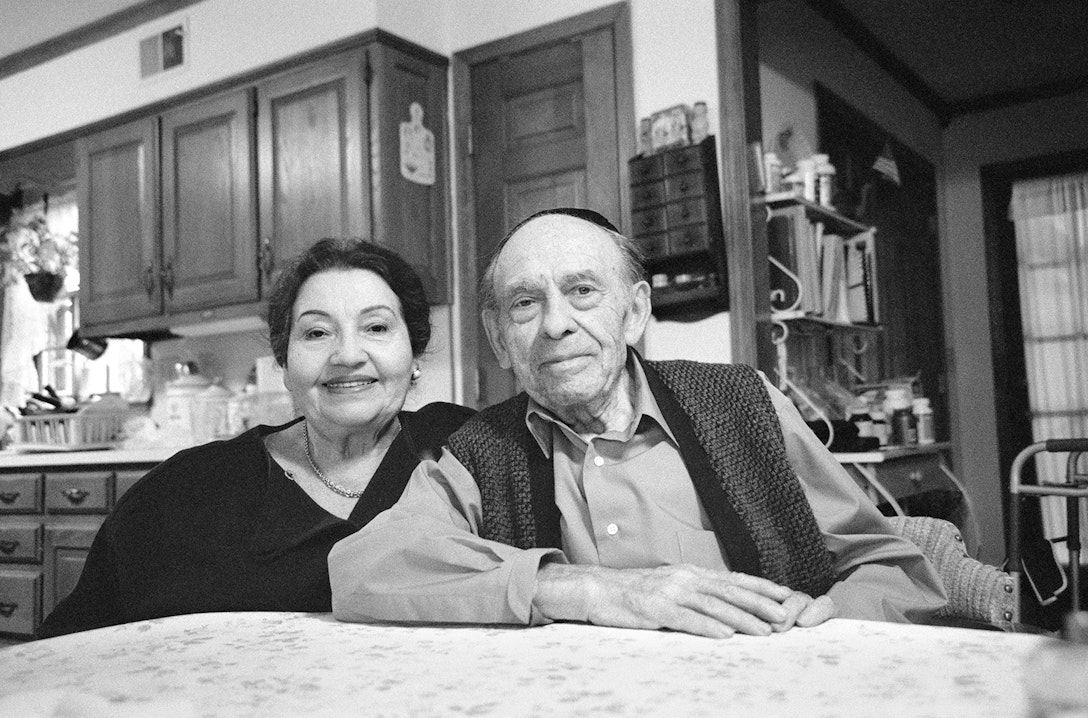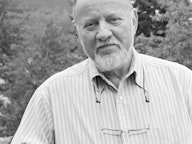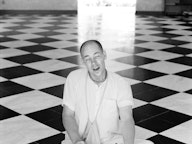
Betty and Cantor Isaac Goodfriend
Atlanta, Georgia, USA
THE FINGER OF GOD
— Betty —
It was in January 1945. The war was over. And for us it was the beginning of the death march—the last march that the Nazis organized to take the living people, Jewish people who were still in the concentration camps, and march them in January in Poland, with high snow, and 30-below zero, without food or proper clothing.
We stopped in one place and we saw a village, and a friend of mine and I decided to go out in the village to ask for some food. My sister was with me and I thought maybe I could get some food for her. Coming back, the camp was gone, the group that I was with from the camps was gone. And I wasn’t the only one. There were about 18 girls who felt the same way—that they’d take a chance and go out and ask for food from the Polish farmers. Many of them said, ‘Well, my mother is there, my sister is there, I’m going to run after the camp.’
And I said, ‘If this was a happening to keep me away from where the rest of the people, the majority of the people with me, should be, we should go away and I should stay here. This was a sign of God.’ We call it in Hebrew etzba elohim, the finger of God was pointing to me. That if I broke away from the big group, I’m going to stay here; I am not going to run after, and whatever will be will be. Maybe in the morning we can go back to the village and find somebody who will take us in. Three other girls stayed with me, and all three of us survived. I’m not going to go into a detail which was really the finger of God because there was a German soldier with a big rifle looking for us. He couldn’t find us, and we survived.
— Isaac —
So I came home [from yeshiva, college] for Pesach [Passover] and it was a day before Pesach. My father was searching for chametz, for the unleavened bread, the night before Passover. And so he said, ‘Let's start Maariv; let's do the evening prayer.’ So I see that it's not like any other Pesach; no matzos in the house and my mother’s not cooking. My father started to cry when he recited the Amidah [main prayer]. And he didn’t have to say much, I felt it. So he squeezed my hand, I squeezed his hand, and of course I started to cry as well. And my tears were genuine.
And I said, ‘Please, please God, don’t disturb the festive feeling of Pesach. Festival of freedom. Let us celebrate Pesach like we used to.’
So what happened? Next morning, my father opened the store, a dry goods store and a customer from Galitzia was waiting for us, a cash customer. And he gave a very nice order for merchandise; paid cash. After half-hour my father was back home smiling from ear to ear. ‘Yontif, it’s yontif, the festival. And with cash it was no problem getting food. So I believe wholeheartedly this prayer helped. God heard it. ’Cause I’m sure we’re not the only poor people in the world. [God] probably heard from many other poor people. But it’s not the point. The point is that we were helped. And we believed, yes. He didn’t give him a telephone call [to say]: ‘Go, go to Goodfriend’s store.’ No, no. He made it happen. Just so happens he [the customer] came. He didn’t go to Goldberg’s store, to Greenberg’s store, to Rosenberg’s store.
There was one merchant after the other, the same merchandise; he came to our store. You have to zero in, yes, this is the reason. This is the reason why we had Pesach. Because of the prayer.
Daniel’s Reflection
Betty and Isaac Goodfriend were part of the very fabric of my life growing up in Atlanta, Georgia. Isaac was the chazan [cantor] of my synagogue for 35 years and both Betty and Isaac were Holocaust survivors. Both escaped. Isaac was in a labor camp and escaped in 1943. He was hidden by a Polish farm family who were vendors to Isaac’s father’s store. Because of his blue eyes and blondish hair, they were able to pass him off as a cousin. Betty escaped from one of the infamous “death marches” the Nazi’s organized at the end of the war as they retreated with concentration camp prisoners back to Germany.
These two met and married in a Displaced Persons (DP) camp in Germany after World War II and their wedding in January 1946 was believed to be the first Jewish wedding in Berlin after the war. Isaac tried to make a living as a cantor in Berlin. Then they went to Canada...then to Cleveland... and then Atlanta. In Atlanta, Isaac was involved in politics and was asked by Jimmy Carter to sing the national anthem at his inauguration. Isaac was also very involved in the creation of the U.S. Holocaust Museum in Washington, D.C.
The Goodfriends were, indeed, good friends, dear friends, of my parents and our family. Our families both spent time in Cleveland and the mutual commitment to yiddishkeit (Jewish living) ties our families together to this day. I remember many Passover seders and holiday meals together. Their youngest son, Perry, and my sister Julie and I got our tonsils out together at the same time and had adjoining rooms (funny, the things you remember!). My mother deeply mourns losing her friend Betty who confided in her. My mother keeps a sweater of Betty’s in the trunk of her car in case she gets cold. Betty and Isaac were and are still so very dear to us.
So what spiritual lesson do I take away from my interview with the chazan and chazanta? So many lessons! Faith is a powerful force for survival. And, that survival is both a function of faith and fate. (The title of Issac’s biography is By Faith or By Fate: A Personal Story.) We cannot depend on all human beings to be righteous and kind but, as Rev. Martin Luther King, Jr. distilled the words of Theodore Parker: “Let us realize the arc of the moral universe is long, but it bends toward justice.”
What I learned most from Isaac and Betty Goodfriend is—regardless of your circumstances— be a positive force in the world. Do good, regardless of what has been done to you. Reach out to others in friendship and to help. “Justice, justice you shall pursue,” as it says in the Torah (Deuteronomy 16:20). “Be Holy because I, the Lord, am holy” (Leviticus 19:2). “Love your neighbor as yourself” (Leviticus 19:18).
These are all lessons Betty and Isaac Goodfriend lived every day of their lives.
I honor the memory of Betty and Isaac Goodfriend. They both enriched my community, my family, and my life so deeply. Their souls are very much alive amongst us.
Permissions and References
-
Goodfriend, Isaac. 2001. By Faith or By Fate: A Personal Story. Taylor Trade Publishing; first edition.
-
Rev. King, Martin Luther, Jr.; a distillation of the words of Theodore Parker:
“Let us realize the arc of the moral universe is long, but it bends toward justice.”
Explore the portraits by theme
- happiness
- grief
- addiction
- sexuality
- sobriety
- transgender
- alcoholism
- suicide
- homelessness
- death
- aggression
- cancer
- health
- discipline
- abortion
- homosexuality
- recovery
- connection
- enlightenment
- indigenous
- depression
- meditation
- therapy
- anger
- forgiveness
- Doubt
- interfaith
- worship
- salvation
- healing
- luminaries

